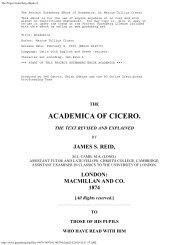From Farm House to the White House - 912 Freedom Library
From Farm House to the White House - 912 Freedom Library
From Farm House to the White House - 912 Freedom Library
Create successful ePaper yourself
Turn your PDF publications into a flip-book with our unique Google optimized e-Paper software.
<strong>Farm</strong> <strong>House</strong> <strong>to</strong> <strong>the</strong> <strong>White</strong> <strong>House</strong>, by William M. Thayer 168<br />
"That is a very reasonable request, General Lee, and surely you cannot refuse it."<br />
Without replying, he immediately wrote <strong>the</strong> following:<br />
"For <strong>the</strong> satisfaction of General Heath, and at his request, I do certify that I am commanding officer, at this<br />
present writing, in this post, and that I have, in that capacity, ordered Prescott's and Wyllis' regiments <strong>to</strong><br />
march."<br />
The next morning General Lee rode up <strong>to</strong> Heath's door, and said:<br />
"Upon fur<strong>the</strong>r consideration I have concluded not <strong>to</strong> take <strong>the</strong> two regiments with me. You may order <strong>the</strong>m <strong>to</strong><br />
return <strong>to</strong> <strong>the</strong>ir former post."<br />
Evidently <strong>the</strong> ambitious and conceited general had come <strong>to</strong> <strong>the</strong> conclusion that "discretion is <strong>the</strong> better part of<br />
valor."<br />
General Lee did not cross <strong>the</strong> Hudson until <strong>the</strong> 4th of December, moving snail-like, although he knew that<br />
Washing<strong>to</strong>n's army was in imminent peril.<br />
"Do come on," Washing<strong>to</strong>n's last plea was; "your arrival may be fortunate, and, if it can be effected without<br />
delay, it may be <strong>the</strong> means of preserving a city whose loss must prove of <strong>the</strong> most fatal consequence <strong>to</strong> <strong>the</strong><br />
cause of America."<br />
The "city" referred <strong>to</strong> was Philadelphia. Washing<strong>to</strong>n had written <strong>to</strong> him that <strong>the</strong> enemy was designing <strong>to</strong><br />
capture Philadelphia, a calamity that must be prevented if possible.<br />
At this time Washing<strong>to</strong>n had removed <strong>the</strong> baggage and s<strong>to</strong>res of his army across <strong>the</strong> Delaware. Being<br />
reinforced, however, by fifteen hundred Pennsylvania militia, he resolved <strong>to</strong> march back <strong>to</strong> Prince<strong>to</strong>n and<br />
await developments. On his way he met General Stirling, who had evacuated Prince<strong>to</strong>n, as Cornwallis was<br />
marching upon it with a large force. Returning <strong>to</strong> Tren<strong>to</strong>n, he hastily collected all <strong>the</strong> boats possible, and<br />
conveyed his whole force over <strong>the</strong> Delaware, including General Stirling's command from Prince<strong>to</strong>n. The<br />
rear-guard had scarcely crossed <strong>the</strong> river when Cornwallis appeared in <strong>the</strong> distance with his "bannered hosts."<br />
As Washing<strong>to</strong>n had taken possession of all <strong>the</strong> boats and transports, <strong>the</strong> enemy could not cross.<br />
The tact and skill of Washing<strong>to</strong>n as a general were as conspicuous in his retreat through <strong>the</strong> Jerseys as <strong>the</strong>y<br />
were on any battlefield. Thomas Paine accompanied <strong>the</strong> army, and he wrote:<br />
"With a handful of men we sustained an orderly retreat for near an hundred miles, brought off our<br />
ammunition, all our field-pieces, <strong>the</strong> greatest part of our s<strong>to</strong>res, and had four rivers <strong>to</strong> pass. None can say that<br />
our retreat was precipitate, for we were three weeks in performing it, that <strong>the</strong> country might have time <strong>to</strong> come<br />
in. Twice we marched back <strong>to</strong> meet <strong>the</strong> enemy, and remained out until dark. The sign of fear was not seen in<br />
our camp; and had not some of <strong>the</strong> cowardly and disaffected inhabitants spread false alarms through <strong>the</strong><br />
country, <strong>the</strong> Jerseys had never been ravaged."<br />
On <strong>the</strong> 12th of December, General Lee had marched no far<strong>the</strong>r than Veal<strong>to</strong>wn, eight miles from Morris<strong>to</strong>wn.<br />
He continued <strong>to</strong> disregard Washing<strong>to</strong>n's appeals and instructions, receiving one almost every day. In some of<br />
<strong>the</strong>m <strong>the</strong> commander-in-chief showed that his patience was well nigh exhausted.<br />
"I am surprised that you should be in doubt about <strong>the</strong> route you are <strong>to</strong> take after my definite instructions," he<br />
wrote on <strong>the</strong> 11th of December.<br />
"I have so frequently mentioned our situation, and <strong>the</strong> necessity of your aid, that it is painful for me <strong>to</strong> add a















